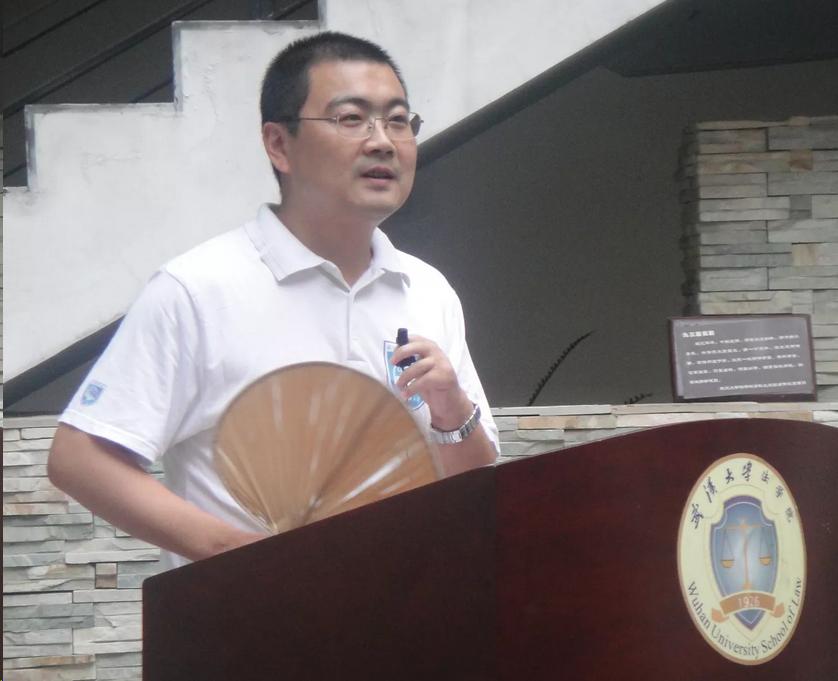Today I received the sad news that Professor Zhang Wanhong of Wuhan University, a man greatly respected and admired in the Chinese law community both inside and outside China, passed away at age 49. His former students and colleagues have put together a Padlet postboard at which all are invited to leave words, photos, audio, and/or video in tribute: https://padlet.com/liuhanxu/PIDLIMEMORIAL.
Here is an obituary by four of his former students and colleagues. It sums up why so many of us thought so highly of him. He will be missed.
In Memoriam: Zhang Wanhong, 1976-2024
Zhang Wanhong, a renowned scholar of human rights and public interest law, a dedicated advocate of social justice, a legal educator, a professor and doctoral supervisor at Wuhan University, died at 5:47 a.m. on 29 June 2024 in Wuhan, at the age of 49, due to a critical illness.
Professor Zhang was born on June 15, 1976 in Luoyang City, Henan Province. He studied at Wuhan University from 1993 to 2004, where he received his Bachelor of Laws, Master of Laws, and Doctor of Laws degrees; he also studied at Columbia University School of Law, where he received an LL.M. degree and a diploma in comparative law from the American Law Institute in 2012. Starting July 2003, he taught at the Wuhan University School of Law; he was also a Visiting Professor at the China University of Political Science and Law.
Professor Zhang was an empathetic, pioneering, prolific, and socially-engaged academic, who devoted his life to the study and teaching of jurisprudence and human rights. He was dedicated to human rights research rooted in basic principles of jurisprudence, and is one of the most visible and influential scholars in the field of the rights of marginalized groups in China. He co-founded and was the Director of the Wuhan University Institute for Human Rights Studies (a national base for human rights education and training). He played a key role in shifting the paradigm of disability research in China, advocating and promoting a rights-based, empirical and multidisciplinary research methodology. He published more than 60 papers and edited more than 10 books in English and Chinese with reputable academic journals and publishers, major newspapers and magazines at home and abroad, covering various topics such as legal aid, disability rights and business and human rights. He also led over a dozen major national research projects, including projects funded and commissioned by the National Social Science Fund and the State Council Information Office.
As a lifelong advocate for human rights and the public interest, he drew his academic insights from spending time on the ground and working shoulder to shoulder with communities. Through the years, he founded the Public Interest and Development Law Institute (PIDLI), East-Lake Institute for Social Advancement and other social organizations working to empower disadvantaged communities to use legal tools to advance their own rights, where he, together with colleagues and students, conducted community needs assessments, convened seminars and conferences, and organized participatory legal education for community members.
His rigorous academic achievements made him a guest, member, and consultant of numerous prestigious academic institutes as well as high-level domestic, regional, and international organizations.
Through these affiliations, he made policy recommendations, promoted the domestic application of international human rights standards, and illuminated for the world the experience and learnings from China. He was involved in drafting a series of laws and regulations concerning human rights, and participated in the formulation and drafting of National Human Rights Action Plans and the National White Paper on Human Rights. In 2017, as an independent expert, he drafted China’s combined second and third periodic reports of States parties to the Convention on the Rights of Persons with Disabilities. He was nominated as a candidate for a member of the Committee on the Rights of Persons with Disabilities for the period 2025-2028.
In addition, Professor Zhang was an effective, approachable, and innovative educator. As a professor of jurisprudence, a believer the law and literature movement, and a “movieholic (as well as a coffeeholic),” he masterfully weaved movie and literary materials into his teaching, turning abstract legal principles into vivid life experience and sparkling serious reflections on the concept of justice and rule of law. His impact went way beyond the classroom, as he was always extremely generous in providing career and life advice and assistance to his students and colleagues. He also lived as a role model and inspired many to be independent, open-minded, curious, and walk the path of human rights and social justice.
Professor Zhang encouraged everyone he taught to establish good ties and practice virtue all over the world. He himself lived by this motto, and that’s why he is respected, celebrated, and missed by so many.
A truly dedicated teacher, a humble and quick-witted learner, a kind and generous spirit, and a wonderful example for us all — may Professor Zhang rest in peace.
Peng Ding, Wei Gao, Zhong Huang and Hanxu Liu, former Public Interest and Development Law Institute staff

Michael Palmer has asked me to post this comment: “It is with great sadness that I have learned of the passing of Professor Zhang Wanhong. He was a gifted scholar with a wide range of intellectual interests, and an admirable and brave force for positive change in China. I found him also to be a kind and helpful personal friend when I was working in mainland China several years back. I will miss him greatly!”